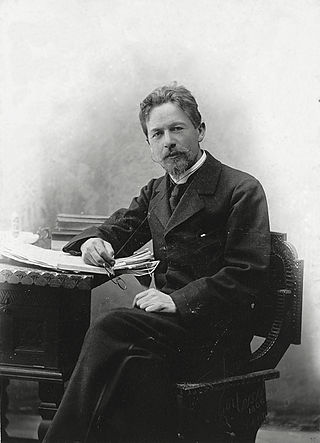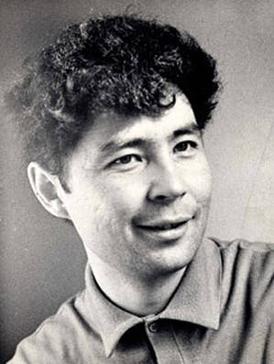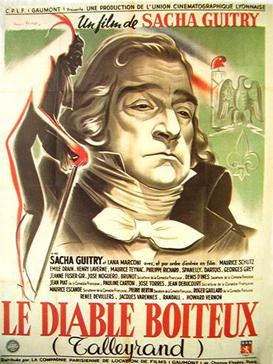Related Research Articles

Anton Pavlovich Chekhov was a Russian playwright and short-story writer who is considered to be one of the greatest writers of all time. His career as a playwright produced four classics, and his best short stories are held in high esteem by writers and critics. Along with Henrik Ibsen and August Strindberg, Chekhov is often referred to as one of the three seminal figures in the birth of early modernism in the theatre. Chekhov was a physician by profession. "Medicine is my lawful wife", he once said, "and literature is my mistress."

The Seagull is a play by Russian dramatist Anton Chekhov, written in 1895 and first produced in 1896. The Seagull is generally considered to be the first of his four major plays. It dramatises the romantic and artistic conflicts between four characters: the famous middlebrow story writer Boris Trigorin, the ingenue Nina, the fading actress Irina Arkadina, and her son the symbolist playwright Konstantin Treplev.

Alexandre-Pierre Georges Guitry, known as Sacha Guitry, was a French stage actor, film actor, director, screenwriter, and playwright of the boulevard theatre. He was the son of a leading French actor, Lucien Guitry, and followed his father into the theatrical profession. He became known for his stage performances, particularly in boulevardier roles. He was also a prolific playwright, writing 115 plays throughout his career. He was married five times, always to rising actresses whose careers he furthered. Probably his best-known wife was Yvonne Printemps to whom he was married between 1919 and 1932.

Three Sisters is a play by the Russian author and playwright Anton Chekhov. It was written in 1900 and first performed in 1901 at the Moscow Art Theatre. The play is sometimes included on the short list of Chekhov's outstanding plays, along with The Cherry Orchard, The Seagull and Uncle Vanya.

The Cherry Orchard is the last play by Russian playwright Anton Chekhov. Written in 1903, it was first published by Znaniye, and came out as a separate edition later that year in Saint Petersburg, via A.F. Marks Publishers. It opened at the Moscow Art Theatre on 17 January 1904 in a production directed by Konstantin Stanislavski. Chekhov described the play as a comedy, with some elements of farce, though Stanislavski treated it as a tragedy. Since its first production, directors have contended with its dual nature. It is often identified as one of the three or four outstanding plays by Chekhov, along with The Seagull, Three Sisters, and Uncle Vanya.
Chekhov's gun is a narrative principle that states that every element in a story must be necessary, and irrelevant elements should be removed. Alternatively explained, suppose a writer features a gun in a story; if the writer features it, there must be a reason for it, such as it being fired sometime later in the plot. All elements must eventually come into play at some point in the story.
Every Good Boy Deserves Favour is a stage play by Tom Stoppard with music by André Previn. It was first performed in 1977. The play criticises the Soviet practice of treating political dissidence as a form of mental illness. Its title derives from the popular mnemonic used by music students to remember the notes on the lines of the treble clef. The cast comprises six actors, but also a full orchestra, which not only provides music throughout the play but also forms an essential part of the action. A chamber-orchestra version also exists.
Ivanov is a four-act drama by the Russian playwright Anton Chekhov.

Alexander Valentinovich Vampilov was a Soviet playwright. His play The Elder Son was first performed in 1969, and became a national success two years later. Many of his plays have been filmed or televised in Russia. His four full-length plays were translated into English and Duck Hunting was performed in London and Washington DC.
Platonov is the name in English given to an early, untitled play in four acts written by Anton Chekhov in 1878. It was the first large-scale drama by Chekhov, written specifically for Maria Yermolova, rising star of Maly Theatre. Yermolova rejected the play and it was not published until 1923.
The Presnyakov Brothers, Oleg and Vladmimir, are writers, playwrights, screenwriters, directors, theatre producers, and actor.

A Month in the Country is a play in five acts by Ivan Turgenev, his only well-known work for the theatre. Originally titled The Student, it was written in France between 1848 and 1850 and first published in 1855 as Two Women. The play was not staged until 1872, when it was given as A Month in the Country at a benefit performance for the Moscow actress Ekaterina Vasilyeva (1829–1877), who was keen to play the leading role of Natalya Petrovna.

The Lame Devil is a 1948 French black-and-white historical film written and directed by Sacha Guitry. A biography of the titular French diplomat Talleyrand (1754–1838), it stars Guitry in the lead role. Originally forbidden by the French censor and turned into a play, the film went on to be released into six languages.

Paul Schmidt was an American translator, poet, playwright, and essayist.
Alexandre Marine is a Russian-born actor-director-playwright currently based in Montreal. On April 23, 1993, he was recognized by the Russian government as a Distinguished Artist of the Russian Federation.
Harvey Pitcher is an English writer, historian and translator. He was born in London, and attended Merchant Taylors' School. During his National Service (1955–57), he studied Russian at the Joint Services School of Linguists, qualifying as an interpreter. Afterwards, he read Russian at St John's College, Oxford, graduating in 1960 with First Class Honours.

René Fauchois was a French dramatist, librettist and actor. Stagestruck from his youth he moved from his native Rouen to Paris as a teenager to pursue a stage career. He had early success both as an actor and as a playwright. Among those with whom he collaborated as his career flourished were Sarah Bernhardt and Sacha Guitry. His career lasted for more than sixty years, and his output was prolific.
The Wedding is an 1889 Russian one-act play by Anton Chekhov.

George Leslie Calderon was an English writer. He was one of the most knowledgeable Englishmen of his generation about Russian life and literature.
The Cambridge Chekhov Company originated in a student production of Chekhov's Ivanov translated by Patrick Miles and directed by Laurence Brockliss and Patrick Miles at the ADC Theatre, Cambridge, 19–23 February 1974. It was presented by the Shadwell Society of Gonville & Caius College.
References
- ↑ "Patrick Miles: Biography". patrickmileswriter.co.uk. Retrieved 11 February 2020.
- ↑ Miles, Patrick (2000). "A Conversation with Bakhtin". Forum for Modern Language Studies, 36, No.4, October 2000. pp.438-49.
{{cite journal}}: CS1 maint: location (link) - ↑ Miles, Patrick (2019). "Emigration". Poetry Nation Review, 247, May–June 2019. p.20.
{{cite magazine}}: CS1 maint: location (link) - ↑ Jones, Charlotte (2019). "Laughing Philosopher". The Times Literary Supplement, 18 October. p.28.
{{cite magazine}}: CS1 maint: location (link) - ↑ Brockliss, Laurence (2019). "[Review]". The London Magazine, June/July 2019. pp.122-27.
{{cite magazine}}: CS1 maint: location (link) - ↑ Pursglove, Michael (2019). "[Review]". East-West Review, 17, no.3, issue 49. pp.39-41.
{{cite magazine}}: CS1 maint: location (link) - ↑ Marber, Patrick (2015). Three Days in the Country. p.vii: Faber & Faber. ISBN 978-0-571-32770-6.